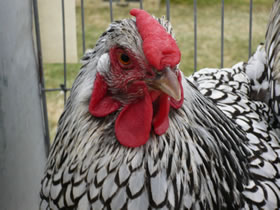 Poultry is a collective term used to describe domesticated birds such as chicken, ducks, geese, turkeys and others. These are mainly used by humans for production and exhibition purposes but some also make excellent pets.
Poultry is a collective term used to describe domesticated birds such as chicken, ducks, geese, turkeys and others. These are mainly used by humans for production and exhibition purposes but some also make excellent pets.
Like all birds, poultry are, too, susceptible to disease. Disease is very common among poultry, especially those used in the farming industry. While it may be impossible or impractical to check individuals for symptoms of disease in a flock of thousands, the effect of disease on a flock can be detrimental to production. Additionally, and most importantly, disease may be an indicator of overall poor welfare...